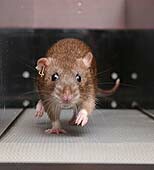
WEDNESDAY, July 6 (HealthDay News) — The next time you indulge in a juicy steak or a hot fudge sundae, consider this: The high you get from eating all that fat may be related to the one you might feel if you smoked marijuana.
The same mechanism that gives pot smokers the “munchies” — that is, a nearly irresistible desire to eat — appears to help explain why people like fat so much, according to a new study involving rats.
The research offers insight into how your body forces you to eat and could eventually help lead toward treatments designed to calm food cravings, said study co-author Daniele Piomelli, a professor of pharmacology at the University of California, Irvine (UCI) School of Medicine.
“When we reach into a refrigerator, and we take that pint of ice cream, there [are] a lot more things happening than we think, and a lot deeper,” Piomelli said. “Unraveling them over time can be helpful.”
At issue in the study are chemicals in the brain known as endocannabinoids, which scientists think are crucial to regulating things such as mood, anxiety and appetite, explained Piomelli, director of the UCI Center for Drug Discovery & Development. Fat appears to activate the chemicals, as does marijuana.
It makes sense that appetite and pot-smoking would be connected, Piomelli added. After all, besides helping people relax and feel less anxious in many cases, marijuana can trigger the “munchies” — a desire to consume food, especially junk food.
In the new study, Piomelli and colleagues from Yeshiva University in New York sought to determine how food affects the endocannabinoid system and which particular aspects of food set it off.
The researchers came up with an experiment. They fed the rats different kinds of liquid solutions — with fat, sugar or protein dissolved in them — and monitored what happened. And since they didn’t want to keep track of the whole digestive system, they created a way to keep the solution from getting all the way to the rats’ stomachs.
They found that only fat appeared to turn on the endocannabinoid system by a signal that traveled to the brain and then to the intestines via a certain nerve bundle called the vagus, and that happened early in the process of digestion. The endocannabinoids, in turn, trigger a craving for more fat.
“The fat hits the tongue, the cannabinoids kick in and more hunger follows,” Piomelli said.
The system appears to be a product of evolution’s interest in making sure that animals eat lots of fat when it’s available, he said. The problem comes in modern life, when the animals known as humans often have plenty to eat.
“In modern life, fat is everywhere,” Piomelli said. “There are McDonalds and Burger Kings. But before the invention of the refrigerator, fats were hard to find.”
What to do with this new information? Piomelli said it provides more support for finding ways to manipulate hunger — particularly your desire to eat more than you need — by disrupting how the endocannabinoid system works.
The problem, he said, is that drugs designed to do just that have made people irritable, depressed and anxious. “That’s why they’re no longer being developed,” said Piomelli.
The new study was supported by the U.S. National Institutes of Health and other federal agencies.
Tim C. Kirkham, a professor of experimental psychology at the University of Liverpool in England, said the challenge is finding a drug that affects the endocannabinoid system but doesn’t enter the brain and cause the psychological side effects.
There’s still hope, study co-author Piomelli said: “Imagine being able to block this mechanism so that when you reach for your pint of ice cream, you have one or two spoonfuls and that would be fine.”
The study appears in this week’s issue of the Proceedings of the National Academy of Sciences.
More information
For more information about obesity, visit the U.S. National Library of Medicine.

